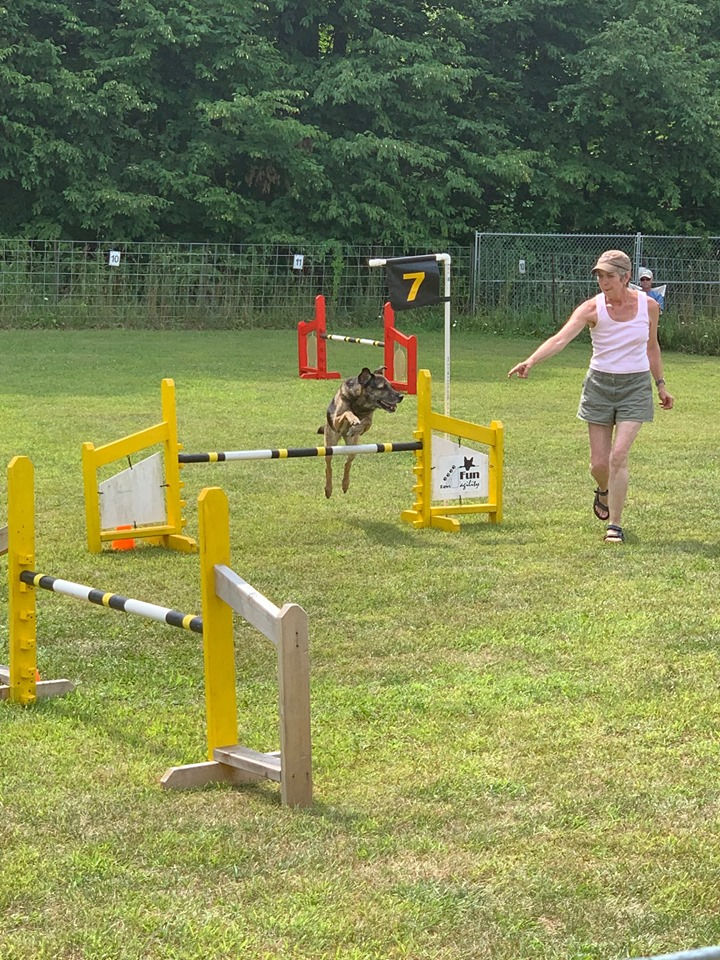A Word About Words
- Hotdiggity Dog Training
- Jun 17, 2025
- 3 min read

Words matter. I’m not talking about the words we choose to avoid causing offense, I’m talking about the words we use to talk to our dogs. I’m talking about making sure we are clear in our meaning.
Dogs prefer to communicate with body language but they have learned that to fit into our lives, our world, they need to listen to our spoken words. So if they’re willing to listen, it’s only fair that we make sure we’re clear in what we’re saying.
So often we are not. We think we are because we know what we mean. We understand our intent. We see it clearly in our mind. But the dog does not.
For example, many people use “down” to teach their dog to lie down. But then they will also use “down” to tell their dog not to jump up, either on people or on furniture. How is the dog supposed to know which meaning their person intends? If a dog jumps on the couch, and their person, not wanting that, says “Down!” why wouldn’t the dog just lie down on the couch? Imagine how confused the dog would be if scolded for doing so.
There’s an easy way to avoid this. If “down” means lie down, then a different word such as “off” would be better used to tell the dog to get off the couch. We want our meaning to be absolutely clear to the dog. We can do that by associating one word with a single behaviour.
But in choosing those words, we have to avoid choosing words that we use in everyday conversation. Consider dogs who have been taught that “okay” means they can move forward out of a “stay”. They may not understand that when they’ve been put in a sit-stay and their person, says “okay” in response to someone they’re talking to is not telling the dog to break out of the stay. The dog, however, hears the word, not the human context.
I get around some of the language problems by using foreign words. For example, for Raylan I use “couchez” for lie down, and “garde” for stay. (I apologize for the mangled French grammar, and more than likely, for the pronunciation as well. The point is though, that Raylan hears a unique word … and doesn’t judge my language skills.)
When I had three dogs, I used English words for Tambo, German words for Sabra, and French for Raylan. That way I could communicate clearly and individually with all three even when they were all within earshot. There was no confusion as to whom I was talking and what I was asking. Admittedly, learning three different sets of commands was tough on my brain, but then I always consider that I’m asking the dogs to learn a whole new language, so I should be willing to do the same. (Plus I figured I was keeping my aging brain active.)
I also use madeup, nonsense, uncommon or unrelated words. While a common command for the recall is “come”, I used “skip” for Tambo, “here” for Sabra, and “deke” for Raylan. (Admittedly, I could have done better than “here” but I was not feeling creative.)
When I teach recall in classes, I ask students to restart their training by teaching their dog a new recall word, different from the one they’ve been using because the dog has learned to ignore that word. I am always surprised by the number of students who come back the next week and say “I decided to stick with my old word because I couldn’t get used to the new word.” It’s one word. Everyone can learn one word. We expect our dogs to learn a lot of words over the course of their lives, so surely we, with our intelligence, can learn one word to make life easier and safer for our dogs.
And that, really, is what it all comes down to: learning to communicate clearly, so that we and our dogs can have a happy and long life together.
Your dog isn’t a mind reader. Don’t make her guess what you want.
.png)



Comments